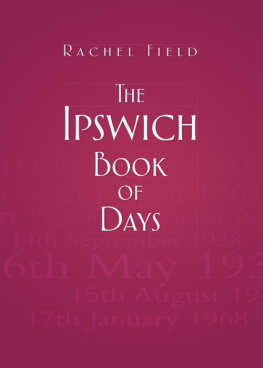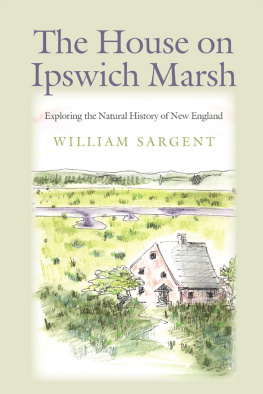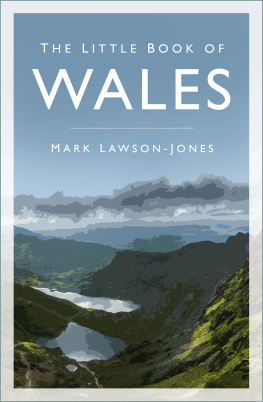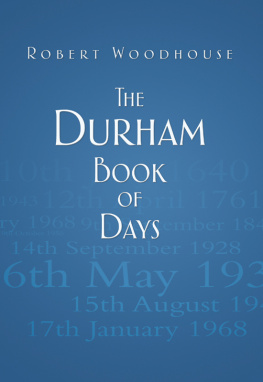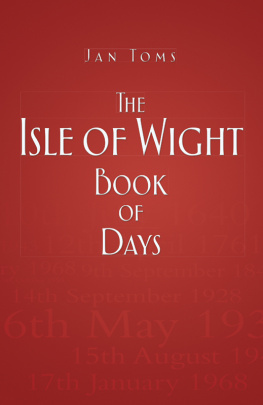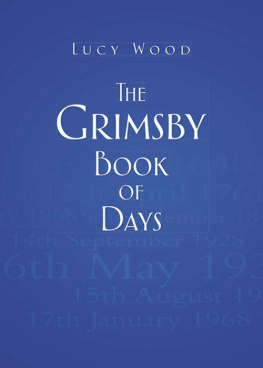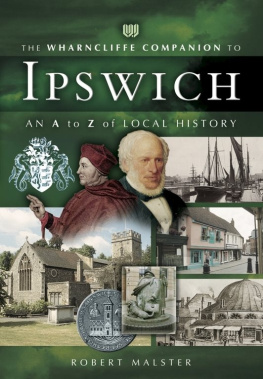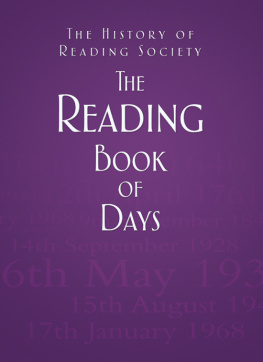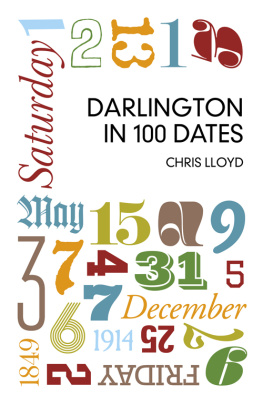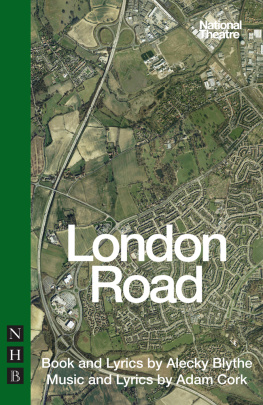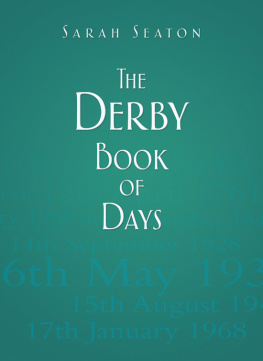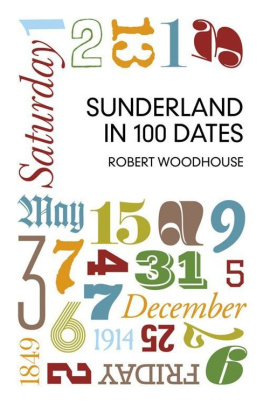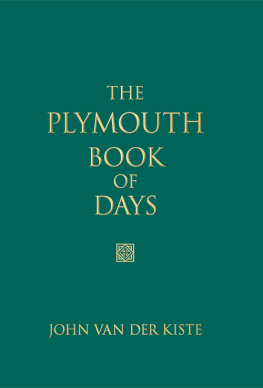With many thanks to Paul Field, Sheila Hardy who gave me my chance Cathy Hunt, Sarah Rixon, and my sister, Linda Appleby.
C ONTENTS
1904: On this Friday a 20hp Mercedes car, owned by William Pretty of Fonnereau Road, was given the registration number DX1 the first car number plate to be issued in Ipswich. (John F. Bridges, Early Country Motoring)

1989: Sergei Baltacha became the first Soviet footballer to play professionally in Britain when he joined Ipswich Town from Ukrainian club, Dynamo Kiev.
Sergei came to England knowing just two phrases. The first was fasten your seat belts, which he had mastered on the flight over from Moscow, and the second was no problem, which he used in all circumstances, and which was why his team-mates ended up calling him Sergei No-Problem. (Mark Gilbey, Never Mind the Bolsheviks)

1997: An all-day protest party marked the beginning of a sit-in which became known as the occupation of Ipswich airport. Ipswich Borough Council owned the airport and wanted to close it to build a housing estate. Businesses and other airport users were given notice to quit and issued with writs when they refused to move out. Several protest marches followed, and there was a lobby at the House of Commons. But, by June, the Pitts Bar had closed, and the occupation ended early in 1998 when the very last aircraft left. (Ipswich Airport Association website: www.ipswichairport.info/)
1794: By January 2nd of this year the Royal Mint had nearly stopped producing coins. Coppers in particular were in short supply, so to help trading to continue the Government allowed some commercial firms around the country to mint and circulate their own tokens.
In Ipswich, James Conder, draper and haberdasher, seized the opportunity and issued several varieties of halfpenny and penny. Some showed Cardinal Wolseys profile, while others featured the market cross or St Mildreds church. On the obverse were Conders initials and an indication of where the tokens could be used (which was usually at Conders warehouse).
James Conder was also an avid collector of trade tokens in general and was the first person to collect and catalogue them. Hence they became known as Conders Tokens, especially in the United States.
Strangely, nearly seventy years later, a hoard of ancient coins was found buried deep under the doorstep of Condors house in the Buttermarket. No one ever worked out why they were there. (William Conder, Conder Family Ipswich)

1824: On his walking tour of Suffolk, the antiquarian David Elisha Davy noted a pungent agricultural smell and wrote: I this morning walked from Martlesham to Waldringfield church, I found a farmer near the church manuring his land for barley with sprats and was a good deal annoyed by the smell. (David Elisha Davy, Journal of Excursions)
1794: The Ipswich Journal reported that cold, dry, windy weather in the previous summer had led to a poor harvest of peas and beans one of the main field crops in Suffolk and a staple of the local diet:
Cold north winds in June brought swarms of green and black lice, which destroyed great quantities of beans and peas all over the county.
Where the lice did not destroy them, the drought that followed prevented them in general from being more than one fourth of a crop. In many parts of Suffolk no rain fell for 11 weeks.
(Ipswich Journal, 1794)

2013: Mick Sanderson, Rolling Stones fan extraordinaire, went into Ipswich to get his latest tongue and lips tattoo done. His body was already pretty much covered in tattoos a shrine to his favourite band of all time. Nothing, though, could beat the portrait on his right leg of former Stones bassist, Bill Wyman, which he would proudly show to anyone interested enough to ask.
When Bill Wyman and his band came to the Regent in 2008, Mick Sanderson met him after the gig and showed him the tattoo. Bill was tickled and took a photo of it. Imagine Micks amazement a few years later when he bought Bills new album Live Communication and there, on the insert, was the photo of his leg! (Thanks to Mick and Ann Sanderson)
1906: Nina Layard (18531935), an Ipswich archaeologist, visited an excavation near the junction of London and Hadleigh Roads (later called Allenby Road). She had been on holiday in Scotland and had read about the dig in the newspapers. Realising that something significant was being unearthed, she hightailed it back to Ipswich to have a look. To her horror she saw that the land was being levelled by unskilled, unemployed men on a work-creation scheme. The site was not being explored it was being destroyed.
Miss Layard set to work organising and supervising the dig. A sixth-century Anglo-Saxon cemetery was uncovered with over 150 burials and associated jewellery, beakers and weapons. Miss Layard saw to it that everything was properly recorded although one of the finds, listed as an iron instrument in a silver case, turned out to be the key and rolled metal strip from a tin of corned beef! As she was a woman, she was not allowed to read her excavation report to the Society of Antiquaries. It was read for her by a male friend.
Miss Layard lived with her companion, Miss Outram, at Rookwood in Fonnereau Road for many years. (Steven Plunkett, Nina Layard, Hadleigh Road and Ipswich Museum)
1994: Tim Yeo, MP for South Suffolk (including the Shotley peninsula), resigned as a minister in John Majors government.
Late the previous year, the Major government had launched a Back to Basics campaign. Its high moral tone had sparked intense media interest in MPs private lives. Tim Yeo, a married man, let the side down almost immediately when a tabloid newspaper revealed he had fathered an illegitimate child by Conservative councillor Julia Stent. The scandal broke on Boxing Day, a quiet news period, and grabbed the headlines all over the New Year. To add to Yeos misery, he was forced to admit publicly that this was his second illegitimate child. He had fathered his first when a student in the sixties.
Yeos words of three years earlier, spoken to a branch of Relate in Sudbury, now sounded rather hollow. He had pronounced: Its in everyones interests to reduce broken families and the number of single parents. I have seen from my own constituency the consequences of marital breakdown. (Express Newspaper, January 4th 2014)

2012: The birthday of Guru Gobind Singh was celebrated at the Gurdwara in Bramford Road, the place of worship for most of Ipswichs 4,000-strong Sikh community. He was the tenth Guru and is honoured by Sikhs for giving them their five distinguishing symbols, which include wearing an iron or steel bracelet and having uncut hair.
On this Sunday, the Sikh holy book was read aloud by a team of readers without any break from beginning to end, and free vegetarian food was available for everyone. (Guru Nanak Temple website: http://ipswichgurdwara.com)
1972: Lancelot de Giberne Sieveking, the pioneer BBC producer, died in Ipswich, having lived near Snape for many years.
His exotic name was fitting. He was German on his fathers side, and related to Gainsborough and Gerard Manley Hopkins on his mothers. In 1924, Sieveking joined the BBC as a producer and playwright and worked there until retirement in 1956. He wrote many plays for
Next page
